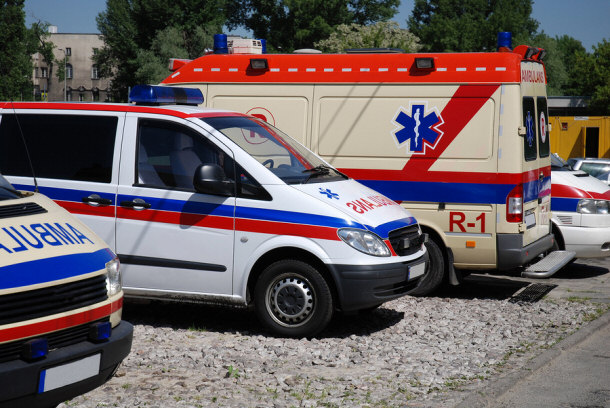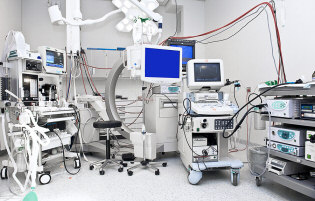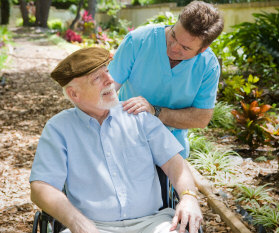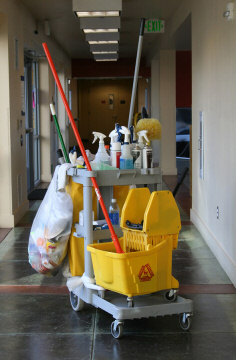15 Unusual Medical Professions

Hospitals are massive structures that can span city blocks and have over 400
dedicated beds for extended stay patients. There are literally thousands of
employees in these hospitals and not all of them are nurses or doctors. Many
times people feel like they cannot be doctors or nurses so they do not think
about looking into the medical field for work. However, there are many more
support staff than there are direct or patient care staff. Translators,
consultants, and even groundskeepers have a place on hospital staff. Below are
some different hospital jobs that you may not have thought of before.
15) Wet Nurse
 Though this word may make you think of times long since gone,
there are still many uses for a wet nurse in todayís time. A wet nurse is
someone who can give milk or donate it to hospitals. You may wonder why this
sort of thing would be needed, but milk is in high demand in most maternity
wards. When a woman is unable to make her own milk and there were none available
her choices on what to feed her new baby would be limited. Worst-case scenarios
involve the death of the mother and in that case the next guardian would have to
find a source for milk. Though this word may make you think of times long since gone,
there are still many uses for a wet nurse in todayís time. A wet nurse is
someone who can give milk or donate it to hospitals. You may wonder why this
sort of thing would be needed, but milk is in high demand in most maternity
wards. When a woman is unable to make her own milk and there were none available
her choices on what to feed her new baby would be limited. Worst-case scenarios
involve the death of the mother and in that case the next guardian would have to
find a source for milk.
Donating milk is a fairly straightforward process. There is a screening procedure that you must pass before you donate.
Screening is to test the donor milk for blood type, any illnesses, or drug use.
Once youíve been screened, you can go to a local hospital or donation center to
pump on site. They are not a mandatory reporting agency, so there is no reason
for you to worry about being in trouble for things that they find in your
donation.
Once you have donated, you will be in a database for further reference. This
means that you no longer have to go through the screening process every time
that you donate milk. The donation itself is always processed and screened for
safety in the same way that blood or plasma donations are. By donating milk you
are giving a family a choice in what their child will be fed. Itís a wonderful
and very overlooked way of contributing to your local community.
14) Translator
 The United States prides itself on being a melting pot of
people. This, however, means that as a country there are tens of languages spoken
here every day. While many people are extremely comfortable conversing in
English when they are discussing sports, the weather, or the shows they watched
last night, they may not be comfortable talking about their health. Medical
terminology itself is difficult to understand when presented in a personís
native language. When it is given to you in a second or even a third language,
then things can get even more complex. No one can blame you for wanting to have
information that directly impacts your health given to you in the language you
understand best. That is why hospitals hire translators. The United States prides itself on being a melting pot of
people. This, however, means that as a country there are tens of languages spoken
here every day. While many people are extremely comfortable conversing in
English when they are discussing sports, the weather, or the shows they watched
last night, they may not be comfortable talking about their health. Medical
terminology itself is difficult to understand when presented in a personís
native language. When it is given to you in a second or even a third language,
then things can get even more complex. No one can blame you for wanting to have
information that directly impacts your health given to you in the language you
understand best. That is why hospitals hire translators.
Trinity Health Network, for examples hires translators in numerous languages.
If you are looking to get into translating, itís a fairly easy process. Checking
what hospitals or medical buildings are hiring in your area is a good way to
start. Also looking up what health network or partnership runs the hospitals in
your area will help you. Once you understand what they are looking for you
simply put together a resume like any other job. Translators may be required to
travel from time to time, depending on need. However, much of their work is also
done over the phone.
13) Mechanic
Hospitals have vans, trucks, and many small-scale mechanical
pieces of equipment around their campuses. When these items get too much use or
break, they sometimes need to be fixed immediately. While it isnít urgent for
say, a lawnmower or cart to get fixed, it is important that patient transport
and medical response vehicles are up and running as soon as possible.

Most hospitals have at least one full time mechanic on their maintenance
staff for that very reason. Itís difficult for people to do their jobs if the
vehicles that they need to perform break down. Some hospitals do run by private
contractors, however, even if the mechanic is a contractor and not directly an
employee of the hospital they may still work in the hospital itself. The
difference between a contractor and hospital employee is that the contractor is
only working for the building. Their paycheck and hiring information is
dependent on a third party company.
Many mechanics are trained in a trade sort of environment and are licensed
and bonded by the states that they work in. This simply means that they have
passed a certain level of skill and education. Many hospitals do require these
sorts of papers before they hire a person on as a mechanic. Sometimes they will
be willing to train, but that is on a case-by-case basis.
12) Plumber
 Like mechanics, hospitals are large buildings that have complex
piping systems. Hospitals also have a history of being quite old and in a
constant state of rebuilding. Because of this there are many different types of
pipes that travel along the entirety of the building. A plumber is important to
have on staff because if anything leaks it can pose a severe safety hazard and
even halt hospital operations. Like mechanics, hospitals are large buildings that have complex
piping systems. Hospitals also have a history of being quite old and in a
constant state of rebuilding. Because of this there are many different types of
pipes that travel along the entirety of the building. A plumber is important to
have on staff because if anything leaks it can pose a severe safety hazard and
even halt hospital operations.
Water isnít the only thing that plumbers would handle on a daily basis in a
hospital environment. Steam lines, for example, are also important for running
sterilization equipment. Autoclaves and equipment washers are utilized heavily
by medical staff. Equipment like a cart washer from Steris requires that it be
properly connected to both a cold water line and a steam line to properly work.
Steam lines are also for heating in larger and older buildings.
Plumbers have to be bonded and licensed by the state like most mechanical
staff. Plumbers in particular are typically part of a union. This adds another
selection screening process in hiring. Getting into the field of plumbing many
times require you to take an apprenticeship for this very reason. However, once
you have passed all of the required fields, the pay goes up considerably.
11) Electrician
Another position that requires an apprenticeship, electricians
are crucial hospital staff. As mentioned above, hospitals are typically old
buildings. Electrical standards are always changing and the ability that older
wiring systems have is dwarfed in comparison to newer and more streamlined
systems. The problem begins when you try to make wiring that is over sixty years
old communicate with wiring that you ordered for next week. Newer equipment such
as C Arm machines by Philips require a certain level of current before they
properly work. Wiring systems from the 1920s simply are not capable of producing
the needed amount of power.

Replacing whole wiring systems is next to impossible for most hospitals.
Instead, they keep both in house and contracted electricians on site. In some
facilities these electricians are nearly indistinguishable. They have the same
IDs the same office, and many times share tools and storage. The difference for
the electricians is that one gets paid by the hospital and the other does not.
Navigating the wiring of buildings that are from the 1800s takes time, practice,
and a lot of experience, therefore itís one of the better paying jobs in the
hospital.
10) Clinical Engineering
 The changing landscape of the medical field means
that technology has to sometimes sync up directly with the patient. Biomedical
Engineering is a relatively new field when compared with other degreed
engineering positions. Course listings from The Ohio State University describe a
very hybrid course that requires the student to understand both complex
electrical systems along with some of the major systems of the human body.
Biomedical Engineers and Biomedical Engineering Technicians are responsible for
keeping the equipment in hospitals operational. They work on everything from
ventilators to imaging equipment. The highly specialized team tends to work hand
in hand with other systems of the hospital. For example, if you are a Biomedical
Technician who is working on one of the Autoclaves, you would contact the
plumber to shut off water and steam to the unit. Then you would call the
electrician to cut power to the unit and lock that out. Then you would be able
to begin working on the equipment. The changing landscape of the medical field means
that technology has to sometimes sync up directly with the patient. Biomedical
Engineering is a relatively new field when compared with other degreed
engineering positions. Course listings from The Ohio State University describe a
very hybrid course that requires the student to understand both complex
electrical systems along with some of the major systems of the human body.
Biomedical Engineers and Biomedical Engineering Technicians are responsible for
keeping the equipment in hospitals operational. They work on everything from
ventilators to imaging equipment. The highly specialized team tends to work hand
in hand with other systems of the hospital. For example, if you are a Biomedical
Technician who is working on one of the Autoclaves, you would contact the
plumber to shut off water and steam to the unit. Then you would call the
electrician to cut power to the unit and lock that out. Then you would be able
to begin working on the equipment.
Obviously a field that combines medical knowledge with traditional
engineering requires a level of education before you are eligible to work as
one. However, itís not required that you go to a traditional four-year
university. There are many associate and accelerated technical programs that
will provide you with enough of a background to work in a clinical environment.
9) Researcher
 Hospitals are not simply places to treat ill people. Hospital
reviews are going down when it comes to direct patient care. With the integration of
specific medical centers and mobile medical check stations, fewer people come to
the hospital unless they are very ill. This means that hospitals have had to
adjust their focus slightly. While they are still dedicated to patient care,
they also house many researchers on staff to work on new vaccines, new systems,
and ways to improve the patient experience. Hospitals are not simply places to treat ill people. Hospital
reviews are going down when it comes to direct patient care. With the integration of
specific medical centers and mobile medical check stations, fewer people come to
the hospital unless they are very ill. This means that hospitals have had to
adjust their focus slightly. While they are still dedicated to patient care,
they also house many researchers on staff to work on new vaccines, new systems,
and ways to improve the patient experience.
These lab positions sometimes require graduate and other advanced degrees
along with a specialization in certain viruses or other medical knowledge.
Hospitals may require up to a doctorate level education for some of their
researchers. Researchers do not just have to be people in lab coats that are
hidden in a basement looking at strange smelling samples all day.
The human element of patient care, according to many medical newsletters, is
becoming more and more important. This means that there are researchers that pay
attention to patient flow, intake, and assess their satisfaction with their
experience. These researchers play a pivotal role in keeping hospitals
competitive in an ever-changing field.
Many hospitals require their researchers to have a degree or strong
background in their field. Human Interaction Design people are becoming more and
more important with every coming year. According to the Indiana State
University, their graduate program places an above average number of students in
comparison to other programs. Human Interaction Design is one of the many
degrees that a person who is interested in researching could check into if they
were interested in working in a hospital setting.
8) Legal Nurse Consultant
 With the complexity of the hospital environment
there are many campuses that have legal consultants on staff. These consultants
have one basic purpose, to review medical laws and keep staff up to date on
changes. Laws and regulations can change multiple times a year and it can prove
to be too much for doctors and nurses to keep up with on top of their duties to
patients. This is where legal consultants step in. They put out memos and hold
educational workshops when needed to keep staff ahead of the curve and ensure
that the hospital is operating with the most current laws in mind. With the complexity of the hospital environment
there are many campuses that have legal consultants on staff. These consultants
have one basic purpose, to review medical laws and keep staff up to date on
changes. Laws and regulations can change multiple times a year and it can prove
to be too much for doctors and nurses to keep up with on top of their duties to
patients. This is where legal consultants step in. They put out memos and hold
educational workshops when needed to keep staff ahead of the curve and ensure
that the hospital is operating with the most current laws in mind.
They also provide legal council for staff on an as needed basis. When there
are claims against the hospital, it is useful to have a lawyer on staff to
assess the situation immediately. Things change and memories are obscured by
time, so having the most immediate knowledge of an accident scene can be the
difference between a frivolous lawsuit getting paid or thrown out.
Typically a law degree is helpful when looking into these sorts of positions.
The legal jargon that you have to wade through to get these positions can be
daunting otherwise. Some hospitals require you to have a full law degree while
others are content with legal aids. The difference is mostly size and scope of
the hospital. For example, one that handles a lot of high-risk situations would
probably want at least one lawyer on staff along with a team of aids. State of
the art and high-risk operation hospitals as well tend to have more robust legal
representation than other campuses need.
7) Art
Rehabilitation
 Along with researching, there are other ways to bring a
human element into patient care. The Art Institute of New York mentions that
they are seeing an upswing in people who are hired on to work for hospitals and
rehabilitation centers across the country. Not only is art known to be soothing,
there are many studies that point to the idea that painting and drawing can help
patients regain eye or hand control. It is also used to help cognitive and motor
functions in patients who have had strokes. Art therapy isnít just used for
elderly patients either; drug rehab centers in Columbus, Ohio have found that
when their patients are working on art they are less likely to relapse. Along with researching, there are other ways to bring a
human element into patient care. The Art Institute of New York mentions that
they are seeing an upswing in people who are hired on to work for hospitals and
rehabilitation centers across the country. Not only is art known to be soothing,
there are many studies that point to the idea that painting and drawing can help
patients regain eye or hand control. It is also used to help cognitive and motor
functions in patients who have had strokes. Art therapy isnít just used for
elderly patients either; drug rehab centers in Columbus, Ohio have found that
when their patients are working on art they are less likely to relapse.
Art rehabilitation isnít exactly a new idea. The Boys and Girls club, for
example, has a lot of events that revolve around beautification projects. Art is
an excellent way to give someone a creative outlet for whatever is bothering him
or her. It also gives people a sense of accomplishment and pride that is
immediate. This is extremely important when faced with what could be months
before they see much change in their physical state.
To get this sort of job you would need to have an art degree and an
understanding of how to show others to work. Many people add other degrees, such
as special education or end of life care associate degrees to their art degree
to make them more hirable in the medical field. When working with patients it is
important to remember that they may not react rationally. If you are unable to
be calm, soothing, and gentle, this may not be the job for you.
6) Palliative Care
 End of life care has evolved considerably in the past few
years. These days, home health companies like AmeriMedical can deliver equipment
like oxygen concentrators to a patientís home. The equipment can even typically
be run by the patient himself. However, some equipment and much of the
day-to-day household activities may be out of their scope of ability. This is
where home health aids come in. They either work for an individual company as
contractors or they are hired individually by a personís family. Home Health
Aids are able to cook, clean, bathe and do basic chores about a personís house.
Their function is to give the person that they are caring for a level of comfort
in their own home. This is important to the well being of many patients,
particularly the elderly who are resistant to going into assisted living. By
allowing the patient to remain at home, you are ensuring them, and their
families the most comfort possible. End of life care has evolved considerably in the past few
years. These days, home health companies like AmeriMedical can deliver equipment
like oxygen concentrators to a patientís home. The equipment can even typically
be run by the patient himself. However, some equipment and much of the
day-to-day household activities may be out of their scope of ability. This is
where home health aids come in. They either work for an individual company as
contractors or they are hired individually by a personís family. Home Health
Aids are able to cook, clean, bathe and do basic chores about a personís house.
Their function is to give the person that they are caring for a level of comfort
in their own home. This is important to the well being of many patients,
particularly the elderly who are resistant to going into assisted living. By
allowing the patient to remain at home, you are ensuring them, and their
families the most comfort possible.
Home health care people do not actually require degrees in most states,
according to hiring websites. While there is a screening process for many
agencies, there is no law against marketing yourself as a home health care aid
without any training whatsoever. This means that when you are looking for a home
health aid for your loved ones or yourself you need to do your own research.
Criminal histories and backgrounds checks are available to all US citizens and
it is a good idea to use them before you allow someone to have unsupervised
access to your home.
5) Chef
Hospital food has a reputation for being terrible. Itís not always
the case, however. For example, Mt Carmel Health Network proudly has a team of
chefs on hand in their cafeterias. Itís also of note that personal chefs are
becoming more and more popular as information about dietary needs come out. If
you are looking to loose weight or to kick a bad gluten allergy, working with a
personal chef may be just what you need. These chefs tend to come with a history
of work and some form of higher culinary education.
Chef inspecting a salad before serving it:

To become a personal chef you may also want to take a host of dietary
classes. Medically speaking, itís important to give your client the best results
and make sure that they remain healthy. When someone has a specific set of
allergies, then making a meal plan for them can be time consuming and
challenging. However, itís also something that is in fairly high demand in major
cities.
4) Massage Therapist
 There is a difference between a hot stone massage and a
therapeutic massage. A therapist is required to have an advanced degree and a
level of education before they may practice. Massage therapists are able to pinpoint
stress areas in the body and work them out with force if needed. These massages
are not always comfortable; instead they may leave you feeling like youíve been
beaten up. The difference is that once the tension has lifted, you will find
your movement easier. Therapeutic massages do not have to be given in a sports
medicine environment either. Spas like the Charles Penzone Salon offer packages
where a therapeutic massage is offered. There is a difference between a hot stone massage and a
therapeutic massage. A therapist is required to have an advanced degree and a
level of education before they may practice. Massage therapists are able to pinpoint
stress areas in the body and work them out with force if needed. These massages
are not always comfortable; instead they may leave you feeling like youíve been
beaten up. The difference is that once the tension has lifted, you will find
your movement easier. Therapeutic massages do not have to be given in a sports
medicine environment either. Spas like the Charles Penzone Salon offer packages
where a therapeutic massage is offered.
If youíre looking for a job in this field it is important to remember how
much you will be working with your hands. Shoulders, backs, and necks also get a
firm workout when you are giving a hard massage. On top of having to be careful
of the patientís body, your own will get put to work. Itís important to remember
that sometimes you will be the one who needs a massage. However, it can be a
rewarding and relaxing field of study for the correct person.
3) Patient Educators
 Similar
to staff education, patient educators work in hospitals or any extended stay
facility. The basic job of these educators is to explain discharge instructions
to the patient. Sometimes a patient with an extreme illness will have to take
equipment home with them; sometimes there will be topical sites that require a
certain method of cleaning. There are a lot of different things to keep in mind
while a hospital is discharging a patient. One of the measurements of hospital
safety is the readmission rate. This rate is basically the number of patients who are treated in a
hospital then come back with the same issue or complications related to it. Similar
to staff education, patient educators work in hospitals or any extended stay
facility. The basic job of these educators is to explain discharge instructions
to the patient. Sometimes a patient with an extreme illness will have to take
equipment home with them; sometimes there will be topical sites that require a
certain method of cleaning. There are a lot of different things to keep in mind
while a hospital is discharging a patient. One of the measurements of hospital
safety is the readmission rate. This rate is basically the number of patients who are treated in a
hospital then come back with the same issue or complications related to it.
Patient Educators do not necessarily need to have an advanced degree;
however, they do need a history of understanding medical equipment. Hospitals
are looking for people who have some sort of certification and possibly some
experience working directly with equipment. Itís not uncommon for former medical
equipment salespeople to become patient educators, as they have a wide scope of
equipment in their background.
2) Rental Supplier
Private sector medical supply is becoming a very competitive field. In a small
city like Columbus, Ohio there are many different suppliers for medical
equipment. These
suppliers will bring rental equipment and disposable items such as sponges or
pads to hospitals on an as needed basis. Supplier offices will have a host of
equipment on site that they maintain and are responsible for. They are used when
hospital equipment goes down and cannot be immediately fixed. They are also used
when all of the hospitalís type of equipment is in service.

You do not need a degree at all to work for a rental supplier. While they do
house technicians that have degrees to do preventative maintenance on equipment,
deliveries and cleaning can be done by anyone regardless of education level.
These positions tend to have an on-call shift that requires you to be able to go
to work at any hour, including nights and weekends. Because the medical field is
an around the clock profession, all of their suppliers must be as well.
1) Grounds Keeper
 You can't walk around a hospital campus and not think
about how nice a fountain or a flower bed looks. That is all thanks to the
grounds keepers that the hospital has on staff. It is easy to forget while you
are in a hospital for important things that the world runs normally, even in a
hospital. Doors need cleaned out of leaves and debris, snow needs removed, and
flowers need tended. Grounds keepers are also responsible for parking garages
and trash removal. You can't walk around a hospital campus and not think
about how nice a fountain or a flower bed looks. That is all thanks to the
grounds keepers that the hospital has on staff. It is easy to forget while you
are in a hospital for important things that the world runs normally, even in a
hospital. Doors need cleaned out of leaves and debris, snow needs removed, and
flowers need tended. Grounds keepers are also responsible for parking garages
and trash removal.
If you like being outside this could be a perfect job for you. There is not
always education required, though some schools like DeVry offer an associates
degree in basic technologies that would help. Some of the better-known hospitals
ask for people who have a science background. For example, The Ohio State
University has student workers for the grounds, many of whom are going into
different biological sciences.
Final Words
Hospitals run on people who maintain the lights, the equipment,
and keep the grounds looking nice. There are translators and support staff that
is also important in making sure that things run. If you're interested in a
hospital environment for work, don't be discouraged if you don't exactly want to
have direct contact with patients. As you can see above, there are many
different jobs that you can do in a hospital. Many of them don't directly deal
with patient care at all.
Jobs
Top Lists:
Top 15 Most Physically Demanding Jobs in the World
Top 15 Quick & Easy Money Making Schemes that Work
15 Unusual Medical Professions
15 Unusual Ways Used To Source For Jobs
15 of the Most Underappreciated Jobs
Informational:
Time Management Tips for Freelancers
How to Successfully Work From Home
How to Provide Excellent Customer Support
How to Ace Your Job Interview
How to Successfully Work From Home
Radiation Therapy Career Analysis
Tips for Building Your Freelance Writing Portfolio
Tips for Freelancers to Avoid Burnout
What Does Freelance Writing Mean
Where to Find Legitimate Data Entry Jobs Online
How to Cope with a Pay Cut
Online Jobs from Home for Stay at Home Moms
What are the Benefits of Work from Home Jobs?
Can a Freelance Writer Make a Living Writing Online
Trends in the Job Market and the Growth of the Service Sector |